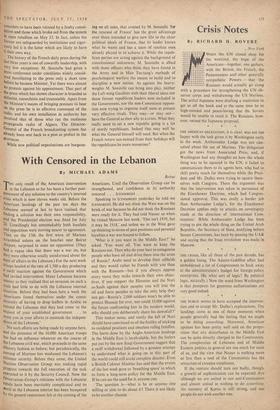With Censored in the Lebanon
By MICHAEL ADAMS
Beirut
THE only result of the, American intervention in the Lebanon so far has been a further post- ponement of any solution to the country's internal crisis which is now eleven weeks old. Before the American landings of the past ten days the Lebanese seemed at last to have realised that finding a solution was their own responsibility, and the Presidential election was fixed for July 24. Unwillingly but unmistakably both loyalists and opposition were moving nearer to agreement. Then on the 15th the first wave of Marines scrambled ashore on the beaches near Beirut Airport, surprised to meet no opposition. (They had a vague idea that there was a war on, but they were otherwise totally uninformed about the state of affairs in the Lebanon.) For the next week troops landed at the rate of 1,500 a day producing a swift reaction against the Government which had invited intervention. Many Lebanese became Uneasy as they realised that an invasion on such a scale had little to do with the Lebanese internal situation. Before they had been here a week the Americans found themselves under the comic necessity of having to drop leaflets in Arabic to remind the Lebanese that they had come 'at the request of your established government . . . to assist you in your efforts to maintain the indepen- dence of the Lebanon.'
No such efforts are being made by anyone here, and the presence of the 10,000 American troops has had no influence whatever on the course of the Lebanese civil war, which proceeds in the same dilatory fashion as before; but paradoxically, the coming of Marines has weakened the Lebanon's ultimate security. Before they came, the United Nations Observation Group was making rapid Progress towards the full execution of the task entrusted to it by the Security Council. Now the Observation Group's relations with the Lebanese rebels have been inevitably complicated and its Work in the Lebanese interior has been hampered by the general resentment felt at the coming of the Americans. Until the Observation Group can be strengthened, and confidence in its authority restored . . . (CENSORED) Speaking to (CENSORED) yesterday he told me (CENSORED). He did not think the West was on the brink of war because he did not think the Russians were ready for it. They had told Nasser so when he visited Moscow last week. 'This isn't 1939, but it may be 1918,' and unless we in the West gave up thinking in terms of past positions and personal loyalties a war was bound to follow.
'What is it you want in the Middle East?' he asked. 'You want oil. You want to keep the Russians out. Then why do your best to antagonise people who have oil and drive them into the arms of Russia? Arabs need to develop their oilfields and they would rather be friends with you than with the Russians—but- if you always oppose every move they make towards their own objec- tives, if you support the Husseins and the Nuri es-Saids against their peoples you will lose the oil and force peoples to take the only help they can get—Russia's. 2,000 soldiers won't be able to protect Hussein for ever, nor could 10,000 against the forces confronting him in the modern world; why should you deliberately share his downfall?'
This makes sense, and surely the fall of Nuri should have convinced us of the futility of sticking to outdated positions and obsolete ruling families. The harm done by the Anglo-American landings . in the Middle East is incalculable, but the feelers put out by the new Iraqi Government suggest that a swift withdrawal followed by a genuine attempt to understand what is going on in this part of the world could still avoid complete disaster. Even a British Cabinet Minister has said that the events of the last week gave us 'breathing space' in which to form a long-term policy for the Middle East. If he can see the need for it, anyone can.
The question is—what is he or anyone else willing or able to do about it? There is not likely to be another chance.


































 Previous page
Previous page